Ebola nurse Pauline Cafferkey transferred to London unit
- Published
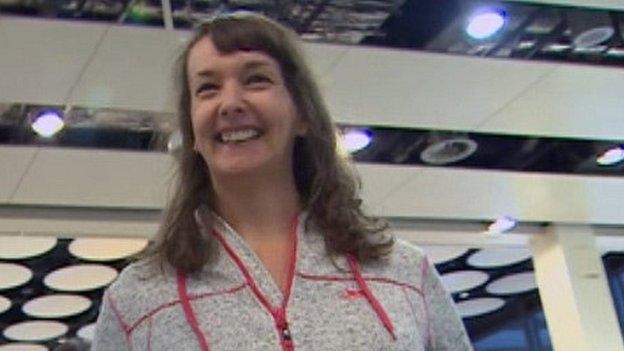
Pauline Cafferkey is said to be doing "as well as can be expected"
A health worker who was diagnosed with Ebola after returning to Scotland from Sierra Leone has arrived at a specialist treatment centre in London.
Pauline Cafferkey, who flew to Glasgow via Casablanca and London Heathrow, was taken to the Royal Free Hospital.
She is understood to have been flown to RAF Northolt in an air force plane after leaving Glasgow in a convoy.
Passengers on flights she took to the UK are being traced, but officials say the risk to the public is very low.
Ms Cafferkey was part of a group of up to 50 NHS healthcare workers who returned to the UK at the weekend after volunteering in Sierra Leone.
Scotland's First Minister Nicola Sturgeon said she was "doing as well as can be expected in the circumstances".
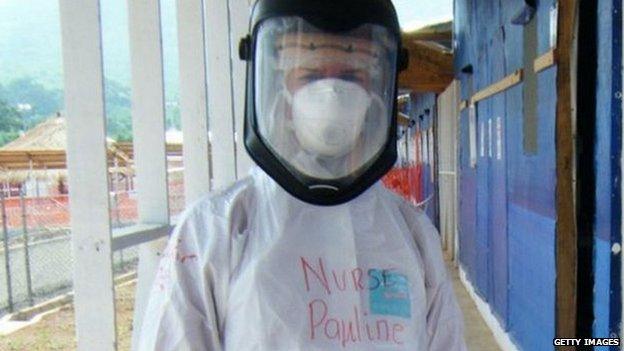
Ms Cafferkey travelled to Sierra Leone in November
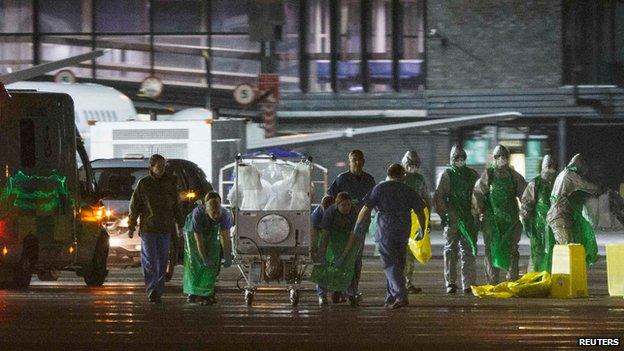
Ms Cafferkey left hospital in Glasgow in the early hours of Tuesday
Ms Cafferkey, who had been working with Save the Children in Sierra Leone, arrived in Glasgow on a British Airways flight on Sunday but was placed in an isolation unit at Gartnavel Hospital on Monday morning after becoming feverish.
Ms Sturgeon told journalists that as a precaution, Health Protection Scotland has traced and contacted, or left messages with, 63 of the 70 other passengers who were on the same flight from London to Glasgow as the patient.
Efforts to contact the remaining seven passengers will continue, according to Dr Syed Ahmed, clinical director of the Public Health Protection Unit at NHS Greater Glasgow and Clyde.
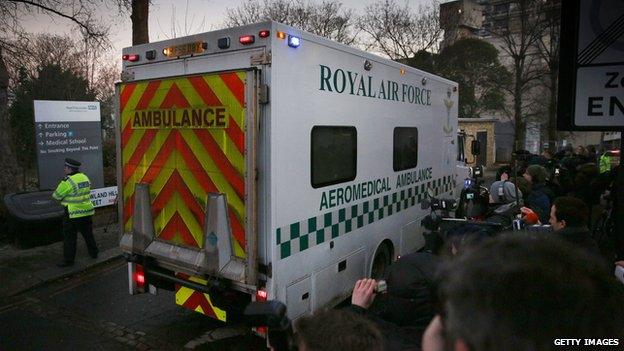
She arrived at the Royal Free Hospital in north London just before 08:00 GMT
Health Protection Scotland has also contacted and given advice to the one person who Ms Cafferkey came into contact with after arriving in Scotland.
There is no plan to test any of the other 70 passengers who were on the flight unless they develop symptoms.
The eight people who were in the "close contact group" seated near to the patient on the plane have all been contacted or had messages left for them.
A telephone helpline has been set up for anyone who was on the BA 1478 flight which left Heathrow Airport on Sunday evening. The number is 08000 858531.
Ms Sturgeon said the risk to the public was "extremely low to the point of negligible".
A spokesman for the prime minister, who chaired a Cobra emergency committee meeting on Tuesday, said: "Robust and well-practised procedures were followed and the risk to the general public remains very low."
'Chaotic' screening process
Dr Martin Deahl, a consultant psychiatrist who travelled back from Sierra Leone with Ms Cafferkey, criticised the screening process at Heathrow as "a bit chaotic".
Dr Martin Deahl: "The whole process was a bit chaotic"
He said there were too few staff to deal with the returning health workers, the rooms in which they were processed were too small, and the processing team ran out of home-testing temperature kits to hand out.
Dr Deahl described the quarantine advice as "topsy turvy", adding he found it "bizarre" that passengers were free to make their own way home from Heathrow but thereafter advised to minimise use of public transport.
When questioned about his remarks, First Minister Nicola Sturgeon insisted the procedures in place "are right in terms of the risk we're facing".
Ms Cafferkey, an associate public health nurse at Blantyre Health Centre, South Lanarkshire, left Gartnavel Hospital in Glasgow just after 03:00 GMT on Tuesday.
She was flown from Glasgow Airport to RAF Northolt in north-west London in an air force Hercules transport aircraft before being conveyed to the Royal Free Hospital in Hampstead, north London.
The BBC's Andy Moore: "She is here being treated in an isolation unit"
She is being treated in the hospital's high-level isolation unit where UK nurse William Pooley - who contracted Ebola in Sierra Leone earlier this year - was successfully treated.
UK Health Secretary Jeremy Hunt said NHS safety measures in place were working well and the government was doing "absolutely everything it needs to" to keep the public safe.
A second health worker who returned from West Africa recently is being tested in Aberdeen for Ebola, it has emerged.
But Ms Sturgeon said there was only a "low probability" the woman also had the disease as she had not been in direct contact with anyone infected with Ebola.
Dr Stephen Mepham explained how the isolation unit works to the BBC's Tulip Mazumdar

Analysis: BBC health editor Hugh Pym
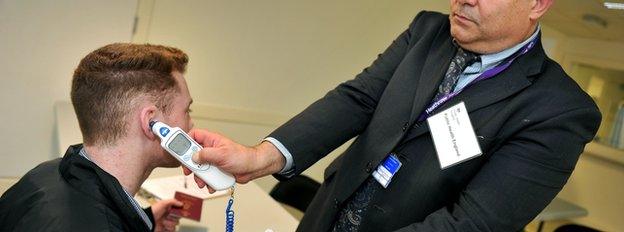
This latest incident will raise questions about the screening process in place for passengers leaving West Africa and arriving at Heathrow.
Public health officials say the woman was taken aside on arrival in the UK and her temperature was taken - the procedure followed for all incoming health staff who say they have been in contact with Ebola patients.
Her temperature was found to be normal and she was not feeling unwell, so she continued her journey to Glasgow.
Someone with Ebola only becomes infectious once they develop symptoms. In this case, that only became apparent after she arrived in Scotland.
The task of contacting the passengers and crew on the flights she took is now under way. That will be complicated, but officials are insisting the risk to those people is extremely low.


Ms Cafferkey had travelled from Freetown in Sierra Leone via Casablanca
Ebola is transmitted by direct contact with the bodily fluids - such as blood, vomit or faeces - of an infected person.
The virus has killed more than 7,800 people, mostly in West Africa, since it broke out a year ago.
The World Health Organization says the number of people infected by the disease in Sierra Leone, Liberia and Guinea has now passed 20,000.

What are the symptoms?
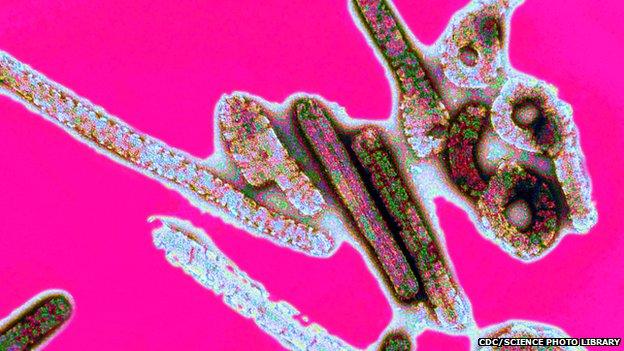
The Ebola virus causes a range of painful and debilitating symptoms
The early symptoms are a sudden fever, muscle pain, fatigue, headache and sore throat.
This is followed by vomiting, diarrhoea, a rash and bleeding - both internal and external - which can be seen in the gums, eyes, nose and in the stools.
Patients tend to die from dehydration and multiple organ failure.
